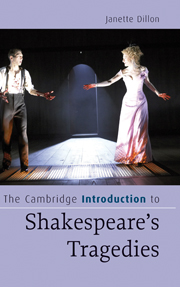Book contents
- Frontmatter
- Contents
- Acknowledgements
- Introduction
- Chapter 1 Tragedy before Shakespeare
- Chapter 2 Titus Andronicus
- Chapter 3 Romeo and Juliet
- Chapter 4 Julius Caesar
- Chapter 5 Hamlet
- Chapter 6 Othello
- Chapter 7 Timon of Athens
- Chapter 8 King Lear
- Chapter 9 Macbeth
- Chapter 10 Antony and Cleopatra
- Chapter 11 Coriolanus
- Notes
- Index
Chapter 9 - Macbeth
Published online by Cambridge University Press: 05 August 2015
- Frontmatter
- Contents
- Acknowledgements
- Introduction
- Chapter 1 Tragedy before Shakespeare
- Chapter 2 Titus Andronicus
- Chapter 3 Romeo and Juliet
- Chapter 4 Julius Caesar
- Chapter 5 Hamlet
- Chapter 6 Othello
- Chapter 7 Timon of Athens
- Chapter 8 King Lear
- Chapter 9 Macbeth
- Chapter 10 Antony and Cleopatra
- Chapter 11 Coriolanus
- Notes
- Index
Summary
Macbeth is the only one of Shakespeare's tragedies for which an eyewitness report of a performance at the Globe survives. Simon Forman, a physician and astrologer, interested in magic and the occult, described a performance of the play in April 1611 in his Book of Plays. The play was probably completed and performed, however, both at the Globe and at court, in 1606. It may well have formed part of the entertainments James I laid on that summer for the visit of his brother-in-law, King Christian of Denmark. The King's Men were paid for three performances of unnamed plays during that period, one at Hampton Court and two at Greenwich. As with Lear, Macbeth is a highly topical play, closely attuned to its political moment, and its references to equivocation (notably in the Porter scene, 2.3), certainly suggest a date following Father Henry Garnet's trial in connection with the Gunpowder Plot on 28 March 1606. (Garnet was hanged on 3 May.) It also spoke directly to several of the King's other interests and concerns, including witchcraft (he had published a book on the subject, Demonology, in 1597), his own ancestry and touching for the ‘King's evil’ (scrofula). Kenneth Muir argues that we should not assume that these subjects were dragged into the play to please and flatter James, but it is difficult to conclude that their insertion was anything other than pointed in this way.
Revision, if not collaboration, is again a question with regard to this play. Scholars have long known that two of the witches' songs recur in Middleton's play The Witch (of uncertain date, but probably later than Macbeth). The usual assumption is that the songs were written by Middleton and inserted into Macbeth at some date after its first composition, and some critics also believe that the Hecate scenes in which the songs appear, 3.4 and part of 4.1, were also written by Middleton or another reviser.
- Type
- Chapter
- Information
- The Cambridge Introduction to Shakespeare's Tragedies , pp. 114 - 125Publisher: Cambridge University PressPrint publication year: 2007

